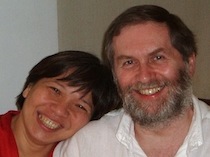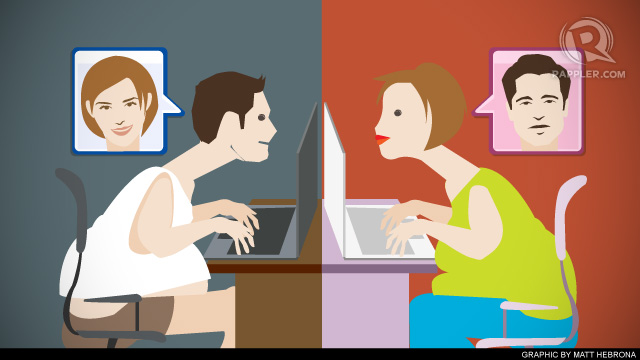SUMMARY
This is AI generated summarization, which may have errors. For context, always refer to the full article.
Rappler’s Life and Style section runs an advice column by couple Jeremy Baer and clinical psychologist Dr Margarita Holmes. Jeremy has a master’s degree in law from Oxford University. A banker of 37 years who worked in 3 continents, he enrolled in, and subsequently gave, workshops in work-life balance and gender sensitivity training. He has been training with Dr Holmes for the last 10 years, as co-lecturer and occasionally as co-therapist, especially with clients whose financial concerns intrude into their daily lives. Dr Holmes needs no further introduction.
 Dear Dr Holmes and Jeremy:
Dear Dr Holmes and Jeremy:
I joined an online dating site a month ago. Since then I have met 17 women, all of whom described themselves as younger than they really were and weighing less than they really did. Is it just my bad luck or are all women really liars? — Jimmy
***
Dear Jimmy,
Honesty is a virtue that is generally in short supply not only on the Internet but in nearly all aspects of life.
Just think back to the days when we relied on real people to introduce us to potential dates. Parents, relatives and friends would say that a candidate was a great homemaker (unattractive but a good cook), easy-going (not so bright) or slightly eccentric (mad as a hatter).
Think of the times when we write our CVs. How often do we dwell on our failures, which mysteriously disappear from our memory, rather than our achievements, which assume ever more epic proportions?
Think even of papal conclaves. Of course we will never know but do we really think that Cardinal Ratzinger spent much time extolling the joys of his membership of the Hitler Youth or the inordinate amount of time and energy he seems to have spent not bringing pedophile priests to justice? Or did he instead emphasize other, less unedifying, aspects of his past?
So we can readily understand that the young lissome creatures offering themselves to you over the Internet regularly turn out to be rather older and fatter than advertised.
What is bizarre however is that this is in any way a surprise to you. Perhaps you believe that only women shade the truth when it comes to Internet dating. It would be interesting to know how accurate your own self-description is — any omissions, any judicious shading of the truth? Men are notorious liars, for example, when it comes to how much hair they have left, not to mention penis size!
Or perhaps you are the one person on the planet who believes that the Internet is a virtual reality of honesty. — Jeremy

***
Dear Jimmy,
Thank you very much for your letter, despite its false dichotomy. A false dichotomy, also known as either-or fallacy or as black and white thinking, is when a situation is presented as having only two alternatives, when that is not so.
Other options include a position that is between the two extremes; in other words, when there are shades of gray though, alas, not quite the same 50 shades that EL James describes in her trilogy (long live suburban porn!)
Another is one where the result may be entirely different; in other words, not black, white, or even gray in any of its different hues, but a subtle pink or a fiery red.
Alas, when describing themselves as younger than their real ages, these women may all seem to be lying. After all, under normal circumstances, they should all know their date of birth. However, what if 1, 2 or all of these 17 women are poor at math? Such that 2012 less 1976 equals 26 instead of 36, or even 30?
Describing oneself as weighing less is even less likely to be a lie since not all scales are as truthful as the mirror of Snow White’s stepmother. Not only might these women have inaccurate scales, very likely some of them may have less than 20-20 vision, so much so that 160 lbs reads 140. Indeed, it may even read 116, in which case not only might there be poor eyesight involved but also wishful thinking.
However, 17 out of 17 is really poor odds. As for you being unlucky, well, it seems that against all the odds you have actually met 17 out of 17 women who are all poor at math, and/or have bad eyesight, and/or a feeble grip on reality, and to cap it all, are probably all both old and fat. That, in my estimation, really is bad luck.
All the best. — Margie
– Rappler.com
(Need advice from our Two Pronged duo? Email desk@rappler.com with subject heading TWO PRONGED.)
Add a comment
How does this make you feel?
There are no comments yet. Add your comment to start the conversation.